#Ideological Conformity
Text

By: Andrew Doyle
Published: Feb 17, 2024
This is how it begins. “Why not add your pronouns to your email signature?” “Why not announce your pronouns at the beginning of meetings?” “Why not encourage your staff members to ask for pronouns in day-to-day conversation?” After all, it’s just about being compassionate and creating a more “inclusive” work environment. Only a bigot would object to that…
It’s this kind of skewed reasoning that has led to the firing of Fran Itkoff, a 90-year-old volunteer for the National Multiple Sclerosis Society, who simply expressed confusion when faced with a request that she add pronouns to her emails. “I had seen it on a couple of letters that had come in after the person’s name”, Itkoff said in an interview, “but I didn’t know what it meant”.
We can hardly be surprised when a nonagenarian is befuddled by this strange new quasi-religious ritual, so rapidly has the practice taken hold. This didn’t stop the National MS Society from turning its back on Itkoff, a volunteer whose commitment to the charity dated back for six decades. For committing heresy against the Holy Creed of Diversity, Equity and Inclusion, Itkoff was immediately sacrificed. The statement issued by the National MS Society claimed that her query about pronouns was “viewed as not aligning with our policy of inclusion”.
Declaring pronouns makes little sense in any case, given that they are used in place of a name when talking about someone, not to someone. And besides, human beings are perfectly capable of determining someone’s sex without being told, usually instantaneously. Of course, according to activists, all of this is irrelevant. We are assured that sex has been superseded by “gender identity”, that mysterious sense of self that few of us believe even exists. It would be like being told to announce the colour of your aura every time you began a conversation.
Like the vast majority of the population, I use pronouns to denote the biological sex of the person to whom I’m referring. And I certainly would not comply if commanded to declare my own due to my innate aversion to any form of compelled speech. The lessons of history are clear: when those in authority begin to demand the use of certain phrases, they have taken the first step on the pathway to tyranny. I do not wish to see a future in which we are forced to stand in lockstep and chant the approved slogans of the ruling class.
Of course, the declaration of pronouns is far removed from any such scenario, but the principle to me is sacrosanct. I will not be told what to say by anyone, least of all those who claim to know what is best for the good of society. Authoritarians have always couched their demands in faux-benevolence, and we have seen how gender ideologues have a particular tendency to viciousness and bullying. “Be kind… or else” is not a maxim to which I am willing to capitulate.
To ask for pronouns in the workplace is the equivalent of suggesting that employees pledge fealty to a deity they do not worship. It is a kind of test, a way to ensure that the tenets of Critical Social Justice – otherwise known as “wokeness” – are being observed. Spinoza argued that for any man to “be compelled to speak only according to the dictates of the supreme power” is a violation of his “indefeasible natural right” to be “the master of his own thoughts”. Once you agree to make statements in favour of a belief-system you do not hold, you are surrendering your agency to those who will exploit it.
While the declaration of pronouns remains a purely voluntary matter, it is fair to say that no-one’s free speech is being violated. But the consequences for non-compliance in the workplace are becoming increasingly severe. Members of staff are passed over for promotion, they are smeared as unreconstructed bigots and “transphobes”, and eventually shunned and isolated. I have written before about friends of mine in the acting profession who feel uncomfortable in stating pronouns at the beginning of rehearsals, but know that they are unlikely to be recast if they refuse. This may not be compulsion, but it is coercion.
We see the same phenomenon on social media, where trans rights activists routinely denounce and defame those guilty of the crime of “misgendering”. They report users in the hope of seeing them banned, contact employers and claim to feel “unsafe”, and even occasionally call the police. This is the essence of cancel culture. They are, of course, free to criticise, even in a robust and rude manner. But to seek to destroy someone’s livelihood for their choice of language is fundamentally authoritarian.
In the same vein, we have seen a handful of gender-critical feminists attacking people online for choosing to use “preferred pronouns” in certain cases. Again, the criticism is valid, but once it strays into the realm of libel, misrepresentation and character assassination, these critics are merely borrowing from the playbook of trans activists. In the tenor of some of these online free-for-alls, it has been difficult to tell one faction from the other.
When it comes to the declaration of pronouns, I have often wondered how long it would take before requests transformed into demands. The sacking of Fran Itkoff by the National Multiple Sclerosis Society has the ring of inevitability about it. Many of us saw this coming. This is why we need to be vigilant against anyone who attempts to compel the speech of others, for whatever reason, and in whatever context. If we tolerate this inchmeal erosion of our liberties, we will doubtless live to regret it.
--
If you haven't been following it, Fran Itkoff is a 90 year old woman who volunteered for the MS Society for sixty years after her husband had MS (multiple sclerosis). She didn't understand what all this talk about pronouns was about, asked, and was then told her volunteering services were no longer required.
Some of you may well go, "ew, LibsOfTikTok, ew, ew." Okay, but hear me out: shut up and read the screenshots. They tell the story.
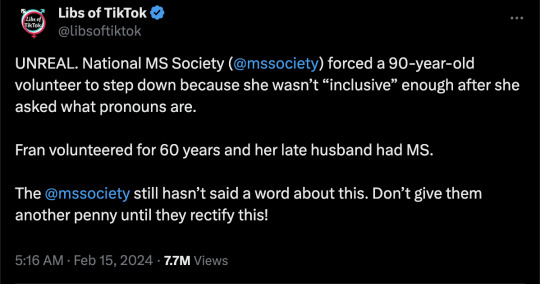
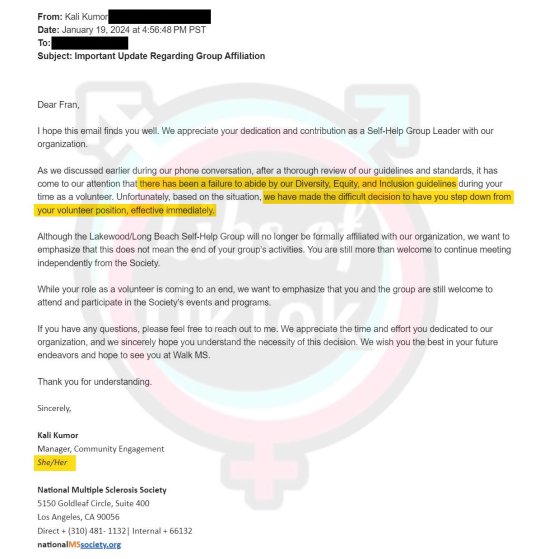

youtube

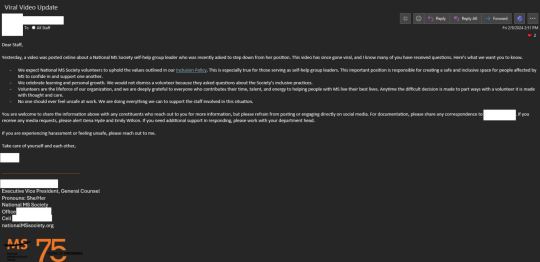


Kali Kumor is the stupid little girl who removed a woman who had dedicated her life, and worked longer than this vacuous apparatchik has been alive, to helping others.



One supposes that all the MS in the world has been cured, given how eager they are to tell dedicated volunteers that they're no longer needed.
--
A few years ago, there was a fuss about atheists being turned away from volunteering activities.
This is the same principle: adherence to their dogmatic ideology supersedes what is supposed to be their organization's mission and purpose: their "telos". This is why you cannot have two "teloi." One will always win over the other.
This is what I mean by ideological capture. The telos of the MS Society is no longer services and support for those with MS, it's "Diversity, Equity and Inclusion." That's their number one objective. And that means pronoun-policing and excommunicating those who aren't part of the cult.
It would seem both humorous, being so petty and stupid, and sad, given Fran's long service to the organization, but as Andrew Doyle points out, it's more insidious than that. It's compelled speech. It's about punishing those who will decline to be part of - or even simply don't understand - the fundamentalist, puritan religious ideology these fanatics have adopted and imbued throughout the organization.
Just as you must testify to Jesus as your lord and savior in order to volunteer at a soup kitchen or to raise money for cancer, they will demand you adhere to the belief in gender thetans in mismatched meat prisons in order to volunteer for the MS Society. In the name of "Inclusion,"
As Fran mentions, the MS Society has always been inclusive, but what she doesn't understand is that it's now Inclusive™, a brand name which doesn't mean including as many people as possible but including as many members of their cult as possible.
They're not looking for behaviors - e.g. respect, tolerance, etc - they're looking for beliefs. Enforcing a particular ideological belief system. They don't care that you might be an atheist who subscribes to secular humanism, or you could be a Xian who believes we're all children of God, they want to make you believe what they believe.
Resist it. They'll try to act like you're just being unreasonable for a small accommodation, but they know that it's how they get you to start complying with their demands. Like Islam, it's one little thing at a time. Don't draw pictures of Muhammad, that's not a big ask is it? Then it's respecting the Quran, then it's not blaspheming Muhammad or Allah, and so on.
#Andrew Doyle#Fran Itkoff#Kali Kumor#MS Society#gender identity ideology#gender ideology#queer theory#pronoun culture#pronouns in bio#pronouns#volunteering#compelled speech#ideological conformity#religion is a mental illness
29 notes
·
View notes
Quote
The more common archetype for success, is the pro-social extrovert. While a charismatic or over socialized midwit will have economic advantages over an autistic genius, society dishonestly downplays the importance of networking, popularity, and social skills to economic success. The shift in the corporate world to becoming more managerial also selects for conformity, which has also disproportionately benefited women, who are generally more conformist and pro-social than men. Managerialism disfavors those who don’t want to put up with the BS, but rather carve out their own path, which are often the traits of geniuses. Both secondary and higher education, especially the generalized liberal arts model, also selects for compliant box checkers. The grading system and university admissions demands that students do well in all fields, rather than hone one specialized skill. This lack of specialization disfavors savants and penalizes risk taking and experimentation, which is needed for innovation. Geniuses would be better off under an independent study model of education. For instance independent bloggers often produce material that is superior to credentialed, overpaid academics, and corporate journalists.
Robert Stark, “Intersectionality of The Smart But Poor” (February 16th 2023).
#Social Status#Isolation#individuality#Individual Success#Global Capitalism#Success Ladder#Conformity#Ideological Conformity#The Managerial Revolution#Current State of Affairs
10 notes
·
View notes
Text
gender believers: "nooo, trans identity is not about stereotypes, in fact, stereotypes and trans identity have nothing to do with each other, nobody thinks they're trans because they're gender non-conforming, where do you get that from??"
gender believers in the next moment:
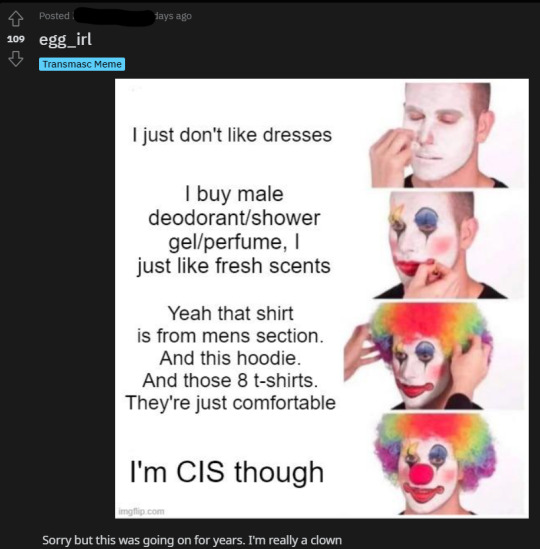
funnily enough, by that metric I'm also transmasc, because today i wore men's deodorant (outrageous, I know) and just this weekend I got a ton of men's shirts, hoodies and jackets
#radblr#radical feminism#radical feminists do interact#radical feminists please touch#gender non conforming woman#gender critical#feminism#gc feminism#gc feminist#gender abolition#radfems please touch#radfems please interact#radfem safe#gender ideology#gender non conforming
313 notes
·
View notes
Text
maybe it's just the context that i have? i'm sure i've posted this before

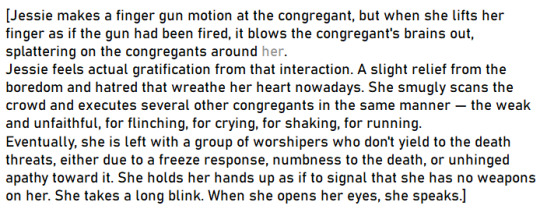
even then???!?!?? there are people who still go to church after God kills their mother!!! there are people who still go to church after the pastor drops dead during the sermon because God decided it was HEART ATTACK TIME!!!!!! THERE ARE PEOPLE WHO START GOING TO CHURCH AGAIN AFTER GOD GIVES THEM STAGE 4 CANCER
SO I CAN'T EVEN SAY "NO ONE WOULD DO THAT" CLEARLY A LOT OF PEOPLE WOULD DO THAT
#idletry spoilers#rough draft disclaimer here#the god kills x thing is from THEIR IDEOLOGICAL FRAMEWORK#BUT some people will really put their entire ass out there and claim it's actually free will to die from cancer#or divine justice. it happened so you must have deserved it is a sentiment i have heard TOO MANY TIMES#BUT! the only way i can see people acting that way is again early indoctrination#as well as the instinct to conform with the group#and jessie's religion has NEITHER of those things#but she DOES have actual physical proof that she is real which counts for something
35 notes
·
View notes
Text

Autistic Expression & Non Conformity
#autism#autistic#neurodiverse#gender#identity#Neurodiversity#Neurodiversity Movement#AutiGender#Non Conformity#Gender Non Conforming#Identity Politics#Gender Identity#Gender Expression#Gender Queer#Gender Critical#Gender Critical Autistics#Gender Ideology#Autistic Voices
27 notes
·
View notes
Text
Found another misogynistic TIM on TikTok
Yep,some of us might be ugly and crusty but you know what? We're still 100% female.
Also,we don't base our worth as women on something fleeting like beauty,unlike trans identified males do.


They're convinced that "cis" women are madly jealous of their hyperfemininity.
No woman is jealous of a pretty man,eeeevil terfs recognize how toxic hyperfemininity is and we're trying to dismantle it...
Of course a man would accept it with open arms,it's all they think a woman is meant to be.
More misinformation on what TERF means:
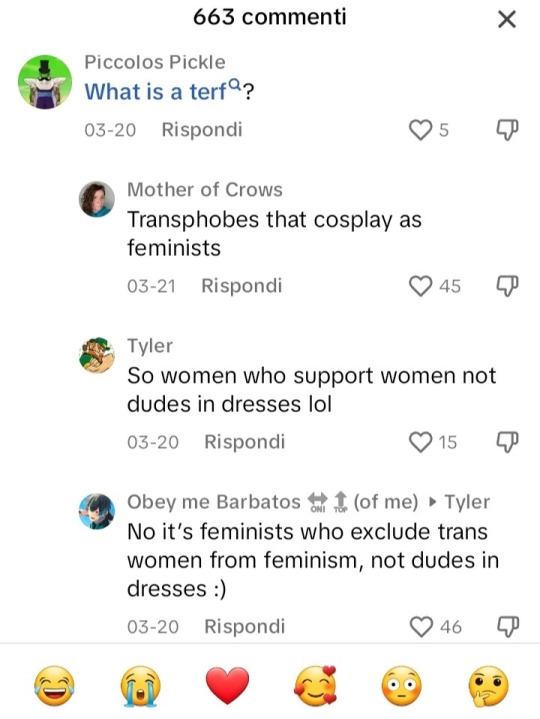


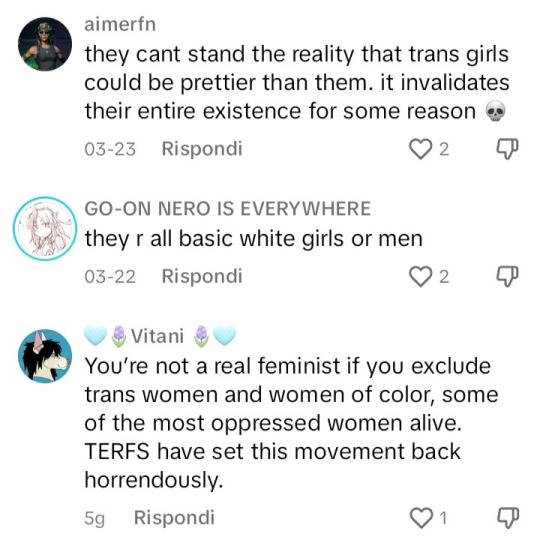
Hating on the woman who gave birth to him and cared for his ungrateful ass.

He has like 10+ videos of him dancing in the women's bathroom,I thought TW just wanted to pee? This is insanely creepy.

To be honest,none of them would pass if it wasn't for heavy makeup,hyperfeminine clothes,invasive surgeries and gender stereotypes. You cannot pass as the opposite sex without relying on stereotypes.
Which again,are harmful to women and makes them feel insecure.
What they think they're passing as,it's in fact the sexist caricature of what a woman truly is (female).
Feminists have tried so hard to make society understand that women are more than their outer appearance,we are human beings.

For TIMs,the epitome of woman is being pretty,conform to gender roles/stereotypes,make sensual poses,wear a shit ton of make up,hair flipping etc.
Sounds strangely familiar to what incels and redpillers preach... Mmmh.
Could it be because this is also misogyny?
For TERFs,the requirements to be a woman is just being born female.
Whether as a female you cannot:
Menstruate,give birth,have breasts/uterus.
They're still things only females can do/have,it doesn't make you any less of a woman.
And the inability to produce offspring doesn't make them male.
Women are not hyperfemininity,women are simply female.
#radical feminism#gender critical#radblr#terfblr#radical feminist safe#video#trans madness#gender ideology#tranz moids#the more they pass the more sexist n misogynistic they are#they're repulsive I swear#trans receipts#also I dont have to conform to hyperfemininity to pass as a woman#people can instantly tell im female make up or not#I just am
40 notes
·
View notes
Text
Since when did shitting on male characters (who are victims, in whatever form they may come in) to promote female characters (who typically aren’t actively angry about what happened to them, as the “ideal” victim) become the defining feature of being a feminist comic fan
#believe it or not being a misandrist is not cool#kelseethe#not to make general statements but so far#every person I’ve seen claiming that 1. Jason is obvs wrong and we shouldn’t think he’s right or#or 2. this female character is a better trauma victim than Jason because xyz#seems to be at least somewhat enthusiastic about female empowerment and promoting female characters/stories#but only at the cost of putting down male characters#their reasoning for why this female character is better is almost always that they've undergone redemption aka ‘bettered’ themselves#by realizing it’s wrong to stay angry and have demands#by conforming to the ideals that the patriarchal systems and the men who enforce this system project onto them#not only is this rhetoric of ‘you should like x character instead of y’ just plain stupid on it’s own#but saying if you’re a woman or feminist you should like x character INSTEAD of y is even stupider#on top of how this is bordering on terf ideology#implying that cis women should only relate to and enjoy stories about other women also implies cis men should only care about men’s pov#regressive and divisive and damaging all around#why do people think Jason fans (whether they be male female or anything else) need to justify liking him#this type of shit leads to the stupidest waste of time discussions#every person who has this opinion also feels the burning desire to tag it with Jason’s name which is just. wonderful#real thoughtful of you to assume we cared or wanted to see that
22 notes
·
View notes
Text
Metalheads who don't like/respect Babymetal bc their "look" isn't, what? Traditionally metal? are so cringe. Like bro it's an alternative music scene we're supposed to say FUCK tradition????? What's wrong w y'all... Embarrassing
And also they are missing out bc Babymetal fucking rules
#its like pol who are like punk is only if you look like *this* and im like. you are asking me to conform to a societal expectation? in PUNK?#like what. the fuck are you talking about. NON CONFORMITY CAN LOOK LIKE ANYTHING. THATS THE WHOLE FUCKING POINT OF NOT CONFORMING#yeah i dont always dress like a typical punk but thats bc the clothes tend to he fucking uncomfortable or a lot of work and i dont care#like why would i put so much effort into looking a certain way... in... a nonconforming alternative group... why would i conform... what#like the way you look doesnt fucking mean shit. a real punk is someone who actually fucking thinks and acts like a punk.#thats all that matters#punk ain't about how you look or causing random mayhem its a fucking. lifestyle. its a culture snd belief system about the world.#its about saying fuck you to the way things are if the way things are isnt fucking fair. its about community and taking care of your fellows#its about safety in numbers against a ruling power that wants people who are different to stop existing.#the mayhem is for a reason. its to say you cant fucking keep us down and if you try we WILL fight back. you cannot keep us down.#thats the POINT.#idk how my post about people being snobs about metal and missing out on good music bc of it turned into a rant about punk ideology but.#well. here we are. i have a tendency of going off on tangents in the tags.....#point is. trying to enforce a 'norm' in a non traditional alternative genre is fucking stupid and against the whole POINT of the thing#and i think it fucking DUMB that ppls get so caught up in appearances when its never been about that
11 notes
·
View notes
Text
This has always been the problem with the Howard Zinn school of history. Zinn’s history of the US resembles a biography written by a bitter former spouse. In lieu of a nuanced and accurate historical account it offers a deliberate slander of our own culture. The result is at once self-indulgent and self-pitying. A balanced account must not flinch from examining our historical mistakes and misdeeds and those of others, but the modern approach to history has too often become a neurotic wallowing in half-truths of our own failures. The corresponding utopian fantasies of other cultures more closely resemble the morality play of a Tolkien novel than the more complex experiences of people who actually lived on Earth.
As UK-based IEA economist Kristian Niemietz recently observed in a short Twitter thread about “anti-Britishness,” signalling disgust at our own culture and history has little to do with truth or helping marginalized communities. Rather, it is a way to advertise the superficial cleverness of radical self-criticism. By castigating the United States on social media or with our K12 or university students, we can flatter our moral egos without needing to donate money or time to communities in need. It fosters division and the main beneficiaries are not Native Americans or other marginalized groups, but whoever is collecting likes and followers online.
We can do better than this. US history should be clear and accurate about the US’s misdeeds, but we should also acknowledge that the US overcame its faults to become a beacon for progress. In the same way, we should highlight the wonderful culture, arts, religion, and so on of American Indians without turning them into pious exemplars of pastoral innocence and moral instruction. Our “ethnic studies” curricula too often lapse into propaganda designed to indict and shame the West and all its works. People and cultures are complex. If students were permitted to understand that human failings are universal but can be overcome, it might help to alleviate the depression and anxiety of those unjustly burdened by the sins of their ancestors.
__________
Christopher J. Ferguson
excerpt from his book review of ‘Indigenous Continent’ by Pekka Hämäläinen @quilette
https://quillette.com/2023/04/27/uncomfortable-history/
#history#analysis of facts vs narratives#quilette#oikophobia#white guilt#bullshit#education#intellectual honesty and proportionality vs sentimentality or pseduo guilt that helps fuckall#examine your assumptions#intellectual honesty vs fundamentalist ideological loyalty#localize your virtue to help people in need where you are vs ideological conformity
24 notes
·
View notes
Text


#so many conservatives love to uphold certain ideologies that they themselves don't live up to but will project that need to confirm onto ppl#homophobia and transphobia comes from a hatred of femininity and a set rules for it that even cis women don't conform to#say what you will abt ms dula peep but she ain't dumb#dua lipa
11 notes
·
View notes
Text
Ngl, I’m not entirely sure where the “Miguel and Hobie hate each other” reading comes from, when from their like. One interaction i don’t personally get the impression they think much about each other at all shdhdjfjf
Miguel seems kind of exasperated with Hobie sure, but the tone of that interaction is relatively lighthearted. It’s more of a joke that by virtue of Miguel being a stringent rule follower, Hobie not caring overly much about those rules exasperates him. And Hobie knows it annoys Miguel and thinks that’s funny, thus prodding him again with the “I’m not even here/nah still here” routine. But there doesn’t seem to be like, genuine personal anger on either side. Just an ideological divide that actualises even further when Miles’ very existence provides another answer to the overhanging stakes.
#I have like. a different post I’m writing talking abt how I think miles actually gives hobie hope and that’s an interesting way to read#their little dynamic#but for the purpose of this post - I get the impression hobie and miguel clash ideologically more so than any personal feelings for one#another on both sides. miguel is vaguely exasperated by a guy who flouts rules but he’s not pissed at him or anything#whereas hobie seems to take specific issue w the idea of having to do things a certain strict way#and this is what he cautions miles about leading up to the intro w miguel#hobie is all about asking WHY you should be a part of certain structures and systems#but I think his beef w miguel and spider society is more on the level of going I don’t like the idea of bowing down to fear of a cosmic#force and not saving people because of that and I’m preparing to dip from that structure once I’ve made a watch for Gwen so if she wants out#she can still choose to help people.#it’s more concern and critique about the harm Miguel + the society stands to perpetuate out of fear by adhering so strongly to this framewor#framework* of canon (this hobie going 😬 at the go home machine) and how that harm stands to land directly on someone like miles by virtue of#the way the system operates. and it operates that way BECAUSE of fear of canon backlash#and of course someone like hobie is going to go fuck that I don’t want to be holding off on saving people and stringently pursuing canon#conformity because I’m scared#wow I’m just detailing the other post I’m making shdhdjfjfj#but yeah the tail end of THAT stream of thought for me is that I think while hobie was disillusioned and critical of this system its#actually miles that gives him hope of being able to change it when he saves the police officer#idk. a lot of extrapolation but I like to think on why hobie agreed to join and why he stays and how he interacts w the society despite#being deeply critical of it#it’s interesting#tunes talks spiderverse
15 notes
·
View notes
Text
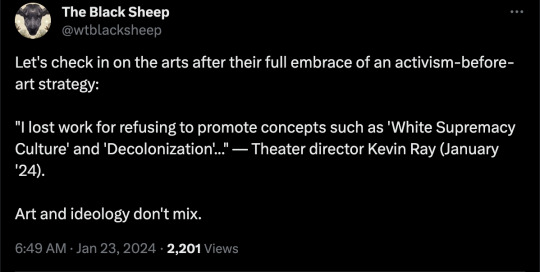

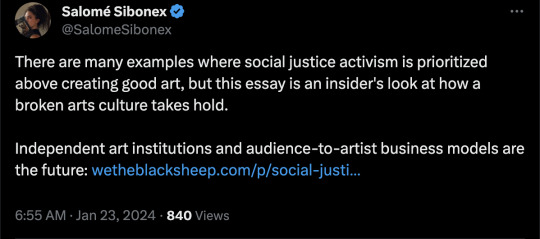
By: Kevin Ray
Published: Jan 23, 2024
Prologue: Navigating Cultural Revolution
I’m days away from starting rehearsals for my third literary adaptation as a theater director; my heart is pounding with excitement and fear. There’s nothing more thrilling than the electricity of a vibrant rehearsal room full of talented, generous, creative actors and designers, collaborating with me to adapt literature into a play, but it’s also anxiety-producing because there are a million creative decisions to make. Nonetheless, the theater is booked and the curtain will rise in October 2024; the only thing to do is persist in the pursuit of making great theater.
The inspiration for this production—an adaptation of a 1924 dystopian novel by Russian heretic Yevgeny Zamyatin—arose from my experience, not in creative persistence, but persisting in the face of an ideology that endeavors to bar heretics like me from the arts.
A culture of the arts without heretics isn’t a healthy culture—it's a boring culture. Regrettably, a small but very loud group of activists in the theater have sidelined heretics by demanding artists conform to an identity-grievance fueled monoculture.
Fortunately, I found a way to make theater. I feared I’d be forced out of the field altogether. I lost work for refusing to promote concepts such as “White Supremacy Culture” and “Decolonization,” I infuriated some by refusing to adopt “gender-neutral pronouns,” and I faced disdain for being white, male, and even for identifying as gay and not “queer.”
Unfortunately, I was prepared to deal with identity-based discrimination—I’ve faced prejudice since the beginning of my career.
Act I: The Wrath of Westboro
I was drawn to theater from a young age, partly because theater groups were welcoming to oddballs, weirdos and outcasts who didn’t fit in elsewhere. Even before it was clear to me, my classmates knew I was gay, and I silently endured daily bullying. Theater was an oasis where I could get away from demeaning comments and fit in with other kids. I relished using my imagination to stand in the shoes of a character who was not me; facing obstacles in a different time and place.
By the late 1990’s I was acting, singing and dancing in a professional production of a musical that toured small and mid-sized cities across the United States. Getting paid to tour in that musical was the epitome of a “dream come true.”
I was lucky to be in that show for various reasons. First, the production held auditions in New York, a city overflowing with talented performers. Being cast in that show was, as they say, “a lucky break.” But this was not the first break I had had in my life.
When I was eight years old, I had a break of a different kind: I broke my neck. The two vertebrae just below my skull were fractured. A neurosurgeon told my mother and me it was rare to see someone with this injury still alive, most people died instantly; the few who lived were permanently paralyzed. After the neurosurgeon explained the procedure he would perform, he looked directly into my eyes and said, “If there is anything you want to do in your life, you should do it before this surgery.” I said I wanted to have another birthday.
I survived; and at twenty-six, I was dancing across stages around the country. More than lucky, that was miraculous.
The last bit of luck I had was the date of my birth. If I had been born a few years earlier, I may not have lived to see my twenty-sixth year. The generation of gay men who came just before me were ravaged by HIV/AIDS. As reported, “by 1995 one American gay man in nine was diagnosed with AIDS.” The epidemic also spawned an anti-gay activist movement.
Enter stage left: the Westboro Baptist Church. Founded by Fred Phelps in 1955, the church gained notoriety in the early 90’s for picketing a park frequented by gay men. As reported, they also “picketed at American soldiers’ funerals, thanking God for killing those who’d fought for a country that ‘institutionalized sin.’ They prayed God would kill Westboro’s enemies.” The musical I was in prominently featured gay male characters, making it a prime target for Westboro’s bigoted activism.
As our tour bus pulled into the parking lot of a Kansas theater, church members stood outside holding signs that read “God Hates Fags” and “Two Gay Rights: AIDS and Hell.” Many in the cast were gay, but to the Westboro protestors we were not three-dimensional human beings with the capacity to love, dream and hate, just like them. They didn’t care about the commitment we had to our craft, the challenges everyone overcame to be cast in the show, and that, at the end of the day, we were all performing in the musical because of our love for theater. The point of identity-grievance activism is to ignore our common humanity and weaponize identity.
The protesters were within their legal right to peacefully hold signs with heinous language. Considering the musical highlighted how difficult the lives of gay men can be because of the discrimination they face, I wonder if Westboro’s activism only deepened the meaning of our show: as they walked past the signs, that audience experienced, first-hand, the ignorant vitriol many gay men encounter.
I was afraid that night, but I did what I had to do: I went on with the show; Westboro didn’t stop me from living my dream.
Despite fringe groups like Westboro, the late 1990’s was a time of great advances for gay men. As the country headed toward a new century, society was becoming more welcoming to a wide variety of minority populations. How could any of us have predicted the identity-grievance nightmare that was to come, and the impact it would have on the theater?
Act II: A New Dream
When actors aren’t working in a show, they survive by holding down a “day job.” Around 2002, I stumbled into a day job as a Teaching Artist. Teaching Artists visit schools on behalf of cultural institutions (theaters, dance companies, orchestras etc.) delivering arts programming, often in under-funded districts that don’t have budgets to hire full-time arts teachers.
I didn’t think I would like teaching, but within a few months I was hooked. The students loved the opportunity to get out of their seats and participate in theater activities, and I was fascinated by the challenge of writing a lesson plan; it was like a magical chemistry experiment: two parts explaining directions, twenty parts playing games, one part classroom management. And it was a kind of performing, the curtain went up every time I entered a classroom.
I remember the exact moment I decided to stop pursuing acting. When I arrived at an elementary school in Far Rockaway, Queens for my third or fourth visit, I opened the door to the classroom, and the students exclaimed, “HE’S HERE!” At that moment I thought, “Nobody is excited when you walk into an audition room, but these kids, their teacher, and you are excited to be together in this classroom – go where it’s warm.”
I worked hard to improve my skills. I read books about teaching, went to conferences, and studied pedagogical theories. But the best way to learn how to teach, is to teach. So I took as many jobs as I could get, working with every age group from pre-K to high school, with students diagnosed with “special needs”, students who predominantly spoke Spanish and Polish, jobs in low-income neighborhoods and jobs at high-profile theaters offering programming for youth from wealthy families. I worked in schools, summer camps, and church basements. I loved theater, and I now loved teaching, which led me to a new dream: to become a theater professor.
In 2008, I enrolled in a graduate program without understanding all master’s degrees are not considered “terminal.” When I completed the program, I was devastated to discover my degree had no value in the academic job market. I sank into a deep clinical depression and spent the next year and a half digging myself out with the help of a skilled therapist. But in 2016, I had another lucky break: I was chosen for a Masters of Fine Arts (MFA) in Theater Directing. I earned my “terminal degree” in 2018. I was on my way to a successful career in academia, but a new kind of activism attempted to kill that dream.
Act III: Something Wicked This Way Comes
In the summer of 2018, I attended a national conference for theater professionals in higher education. A panelist with experience on hiring committees explained, “To teach theater and direct productions at a college or university, you have to have an MFA and you have to show the committee you can get yourself directing work at regional theaters.”
I left the panel deflated. During my final stretch of graduate school, we practiced “elevator pitches” for potential interviews with artistic directors. Although the professor said my pitch was excellent, I wondered, “Who would I pitch to? My chances of meeting with an artistic director are less than my chances of a sit down with the Pope!”
I knew this because an activist movement sometimes referred to as Critical Social Justice (CSJ) was deeply entrenched in the theater industry. In the same way Westboro Baptist Church demonized me based on an identity trait I could not change, CSJ activists in the theater were deciding who was a so-called “oppressor” based on identity. I was nearly everything they deemed “oppressive”: white, male, middle-aged and, probably worst of all, I identified as gay, not queer. For readers unfamiliar with the distinction, gay simply connotes same-sex sexual orientation while queer conjoins sexual orientation with a laundry list of radical leftist politics. Although many claim the word queer is “inclusive” of the variety of identities encapsulated in the ever-growing LGBTQIA+ acronym, as Andrew Sullivan explains, “queer” is “designed to trigger gay men, especially gay men who aren’t politically of the far left … to make us feel we aren’t part of the world or of the community.” Rather than function as a term of inclusivity, “queer” has been weaponized to identify and exclude traitors.
When I asked an aspiring playwright what she thought my chances were, she said white men had been directors “for so long” and it was time that they step aside. I didn’t think a person’s race or sex determined whether or not that person had the skills, talent or commitment to be a theater director.
Theater artists were the last people I suspected would attempt to bar anyone from participating in the arts based on identity. We were the oddballs, outcasts, and weirdos who accepted each other because our differences excluded us from mainstream culture. Now, my colleagues in the theater no longer saw me as a three-dimensional person with thoughts, feelings, and dreams untethered to my identity. Instead, I was nothing but an embodiment of identity characteristics they wanted to amputate.
I ran into a professor from my first stint in graduate school at a reception for theater directors in higher ed. Mid-conversation he said, “Look around this room! I’m the only person of color in here. I’m not feeling supported! Come with me.” Without telling me his intentions, he led me over to the event’s planner and told her the organization needed to do a better job getting “directors of color” into the room. I stood frozen, a dumbstruck pawn furthering someone else’s activist agenda.
I was used as a pawn again when I attended the second night of a festival of theater directors’ projects in development. The first two works came and went from the stage, but the third piece started on an odd note. A bald, middle-aged man stood center stage and a young female director sat far away from him on the stage’s edge. At first, I thought this was a curious experiment in hyper-realism, but I soon realized it was not a performance. The director apologized to the audience for the work presented the night before because, she said, she’d received several emails saying the piece “offended” and “harmed” some audience members. The man center stage chimed in, but was quickly cut off by the director who asserted, “I’m speaking now.” It was revealed the man was a former NYPD officer who asked the director to help adapt his experiences on the police force into a play. Suddenly, audience members who had been at the previous evening’s performance were standing and shouting at the retired officer. Each time he tried to defend himself, the director cut him off saying it was not his “time to speak.” The man’s wife stood up and pleaded, “My husband is a good man! He protected this city on 9/11!” But the ravenous audience continued to shred the retiree over the “offensive” and “harmful" words presented the night before, words we were now not allowed to hear. I never learned what the police officer said that caused this reaction. But from the way he was treated, it seemed his mere existence as a police officer was contrived as somehow “harmful" to these people—who wouldn’t even let him talk. After the “show” I approached the theater’s artistic director and said, “I didn't know I was going to be a participant in a public shaming before I bought a ticket to this event.” She said, “There were some things he needed to hear.”
On a cold January weekend in 2019, I was alone in my Brooklyn apartment desperately trying to hatch a plan to change my prospects in an ecosystem increasingly intolerant of people and views that did not conform to CSJ. To get a college teaching job, I needed to direct something. I decided I could either whine and cry that the activists were preventing me from realizing my dream, or I could create my own opportunity. If I couldn't direct a play at an established non-profit theater, maybe I could independently direct and produce it myself.
ACT IV: Burning Down the House
As part of my Teaching Artist work, I had experience “devising” original plays with youth. Devising is a theater-making technique that means collaboratively creating a play originating from an idea rather than a playwright’s pen. “Devisors” start with source material such as newspaper articles, transcripts of court documents, old photographs, paintings, stories, anything that stimulates ideas a devising ensemble can transform into a play. On that frigid weekend in 2019, I decided to devise a play from ghost stories by Edith Wharton. Best known for her Pulitzer Prize-winning novel The Age of Innocence (1920), Wharton skillfully used fiction to criticize rigid social structures and her lesser-known ghost stories overflow with rich social commentary and wry humor. I pitched the project to some colleagues from my MFA program. Excited both by the stories and my collaborative approach, they all said, “Yes!” They didn't see my identity as a liability, but my employers did.
In the fall of 2019, at an annual “back to school” workshop, I was, for the first time, segregated into what’s called a “racial affinity group.” When asked why we were breaking into groups by race, our supervisor said, “Because we live in a systemically racist country.” I was asked prior to the meeting via a Google survey if I was willing to participate in racially segregated groups, and I responded, “No.” After I was put in the “white affinity group,” I asked the facilitator why I had been segregated at work against my will. She told me she would get back to me. She never did.
At another arts organization, my supervisor called me into a private meeting to reprimand me for refusing to let my co-workers address me with “they/them” pronouns in emails. She said everyone was using “gender-neutral pronouns” in an organization-wide campaign to “dismantle patriarchal systems of oppression.” I let her know that I was a gay man, proud to be one, was not willing to let anyone else decide what my pronouns should be, and that applying pronouns to a person who doesn’t want them is the definition of “mis-gendering.” My supervisor bristled. I said, “Well then, we will have to agree to disagree.” In response, she slammed her hand on her desk, jumped out of her seat exclaiming, “NO!” and left the room. I wasn’t hired back.
I was also pressured to incorporate concepts from CSJ into my teaching. The idea was to “embed” theories such as Paulo Freire’s “Pedagogy of the Oppressed,” Ibram X. Kendi’s “Anti-Racism,” Judith Butler’s “Queer Theory,” Frantz Fanon’s “Decolonization,” Kimberly Crenshaw’s “Intersectionality,” Robin DiAngelo’s “White Fragility,” and Tema Okun’s “White Supremacy Culture” into pre-K to 12 arts-instruction.
Instead of spreading the joy and excitement of theater, I was to use theater instruction as cover for indoctrinating children into a worldview that taught them to see themselves as victims or “oppressors” based on their race and sex. When I voiced concerns, I wasn’t offered further work.
Determined to “dismantle” so-called “harmful white-centered” practices in the theater, activists were inadvertently destroying collaboration. The most important ingredient in collaboration is trust. Trust enables collaborators to bravely take artistic risks as an ensemble. But the activists were sowing distrust by reducing everyone to identities “oppressing” each other; re-casting benign interactions as overt acts of prejudice or covert insults like “white women’s tears” and “microaggressions”—the latter is a doctrine that turns everyday interactions, like asking where someone is from, into a grave racial insult if a listener decides their subjective feelings are hurt. Where there are no real insults or real acts of aggression, “microaggressions” can be manufactured out of thin air. Rehearsal rooms became ticking time bombs where activist artists could hurl overblown accusations of supposed psychic harm at any moment.
Not satisfied with obliterating collaboration, the activists jettisoned their audience. As reported in Washingtonian, when a theater endeavored to revamp its programming to create “the most woke theater in Washington,” the journalist wondered, “Can they do this without alienating a crowd who, liberal as they may be, might also be slower to get with the times?” To which an executive board member replied, “It’s entirely likely that as we continue the work we’re doing, we’re going to lose more people, and I think we’re all okay with that.”
I attended one show that ended by pressuring “the folks who call themselves white” to leave their seats and stand on stage to understand that they don’t “own” their seats. At another show, “non-Black audience members were invited to leave” before the end because the play was “not for or about” them. Some productions held segregated “black out” performances. How do you reach hearts and minds when you’re kicking hearts and minds out of the space?
When the pandemic hit, and all our work meetings took place on Zoom, I repeatedly heard the phrase “burn it all down” from my Millennial and Gen Z colleagues. Their perspective seemed to be the theater that existed before the lockdown was a racist, sexist, misogynist, homophobic, transphobic, xenophobic, capitalist (fill in whatever “-ists” and “-phobics” you could think of) oppressive system of “predominately white institutions” traumatizing artists through a “nonprofit industrial complex” (an oxymoron in any case) that needed to be vaporized. As reported in The Intercept, Millennial and Gen Z employees across the nonprofit sector were, in the words of one anonymous senior leader, “not doing well” and creating a “toxic dynamic of whatever you want to call it - callout culture, cancel culture whatever - [that’s] creating this really intense thing, and no one is able to acknowledge it, no one's able to talk about it, no one's able to say how bad it is.” It should have come as a surprise to no one that, during 2020’s summer of “fiery but mostly peaceful” protests, the atmosphere imploded.
First came the "Not Speaking Out” list, a Google spreadsheet listing the names of not-for-profit theaters that did not make a “sufficient” statement on social media about “systemic racism.” Then came “We See You White American Theater,” a twenty-nine page list of demands for reform that included race-based hiring quotas, ceasing “all contractual security agreements with police departments,” and requiring “creative teams to undergo Anti-Racism Workshops at the beginning of each rehearsal or tech process and ensure accountability with signed statements.” Finally came the targeted attacks on non-compliant individuals. One of the most heartbreaking incidents was the pressure campaign that preceded an executive director’s resignation. Her own staff circulated an online petition to the entire membership stating:
We are here to tell you that, underneath your dress of respectability politics, your slip is showing… it looks like your predatory tokenism of BIPOC staff members, your opportunistic fundraising, and your calculated obstruction of anti-racist programming.
This executive director played a major role in sustaining not-for-profit theater in New York City through the aftermath of 9/11 and "The Great Recession” of 2007-08 and was an ardent advocate for promoting women as leaders in the field. But the petition painted her as a notorious racist who needed to be excommunicated. I was horrified to see the document populated with the names of people I’d known for years. I declined to sign. No one publicly came to this woman's defense because the activists’ tactic was clear: do what we say, or we will cull you from the field too.
Overt discrimination permeated every meeting I attended that summer. At an organization established to support theater directors, one member asked the group’s president, “Can we have a conversation at some point about the ethics of white directors?” When asked for clarification, the member said, “This is about the ethical responsibilities of white… members as we work to transform the American theater… and whether white directors should be directing.” The president responded, “We’ve already begun to put a task force together… to help particularly our white members work through setting up rehearsal halls and production processes that are anti-racist.” It was odd that only white directors were singled out as needing support understanding what is or isn't “anti-racist” because, from what I saw, there was a lot of racial discrimination aimed at white people.
A prime example was American Sign Language (ASL) interpreter Keith Wann, who lost work solely based on his skin color. As New York Post reported, the director of ASL for Broadway’s The Lion King stated, “Keith Wann, though an amazing ASL performer, is not a black person and therefore should not be representing Lion King.” To be clear, and typical of the convoluted logic of this movement, the director was advancing the proposition that only black ASL performers should play the animal characters in The Lion King. Since when was it “anti-racist” to insist that only black people were uniquely fit to play animals? Citing race-based employment discrimination, Wann sued. According to court documents, the case settled in Wann’s favor with lightning speed. Perhaps this employer should have provided staff with “anti-racist” training that included Chief Justice of the Supreme Court John G. Roberts and his plurality opinion in Parents Involved in Community Schools v. Seattle School Dist. No. 1, which states, “The way to stop discrimination on the basis of race is to stop discriminating on the basis of race.”
Activists pressured artists to create theater aligned with their beliefs. As reported in The New York Times, the artistic director of a festival that once prided itself on being “uncensored” canceled a show because the playwright and performer dared to assert, “There are two sexes, male and female.” The artistic director explained, “I support free speech, I think all speech should be legally protected, but not all speech should be platformed.” Jonathan Rauch, Senior Fellow at the Brookings Institute, explains the motivation behind this type of behavior in his book Kindly Inquisitors, “In an orthodox community, the threat of social disintegration is never further away than the first dissenter. So the community joins together to stigmatize dissent.” Stigmatizing unorthodox views by canceling shows that express them is censorship, and theater artists used to know better: In 1992, Stephen Sondheim refused the National Medal of Arts award from the National Endowment for the Arts (NEA), stating it would “be an act of the utmost hypocrisy” to accept the award because the NEA had become “a conduit and a symbol of censorship and repression rather than encouragement and support.”
Unlike film, television and recorded music, live theater has no rating system; it should not look for ways to self-censor. Not only should theater reject self-censorship, it should overflow with a wide variety of plays that explore uncharted, daring and dangerous topics. Why not unleash diverse perspectives on various stages and let audiences decide what they think? Instead, activists insist the theater should be comprised of people who, however much they all may look different superficially, must all share the same beliefs. That’s not diversity, it’s monoculture.
If some artists want to create shows that extol CSJ, they have every right to pursue their projects. However, they have no right to bar other artists from daring to critique CSJ’s inconsistencies and intolerance.
Westboro knew they could hold slanderous signs, but they understood attempting to stop the show was beyond their purview–it’s time CSJ activists in the arts learned that lesson.
A few voices of dissent have begun to document the devastation caused by this activism as Clayton Fox does in his essay “The Toxic Gentleness of the American Theater”, but a New York Times article titled “A Crisis in America’s Theaters Leaves Prestigious Stages Dark” hints insiders know some of this “crisis” was self-inflicted. As an executive director admits, “Some theaters have forgotten what audiences want — they want to laugh and to be joyful and to cry, but sometimes we push them too far.”
ACT V: Building New Institutions
At the risk of being the skunk at the garden party, I don't believe logic and reason can be used to persuade theater leaders to take an off-ramp from their misguided allegiance to CSJ. Their devotion is fundamentalist in nature, and that is nearly impossible to pierce by persuasion, even if someone could get them to listen in good faith.
Look at the example of former Westboro member Megan Phelps-Roper: it took thirteen years of engaging with opposing views before she left the church. At fifty-one, I can’t wait for people to change their minds before I make art. The way to make art now is to build new institutions that state from inception a commitment to freedom of artistic expression, a recognition that ideological conformity is not a prerequisite for participation in the arts, and a pledge to refrain from making statements on social media about current events. If theaters want to tackle current events, do it on the stage.
Despite the storm around me, I pursued my ghost story project. I needed funding, so I looked for grant opportunities. One application asked, “Why this project, why now?” I wrote that a project based on ghost stories was relevant to the moment because they are about our relationship to transgressions in the past. Every ghost story features the living encountering an apparition who returns either to make the protagonist aware of a past injustice, or to punish the protagonist in the present. Considering Ibram X. Kendi declared in How to Be an Anti-Racist, “the only remedy to past discrimination is present discrimination,” I thought it would be meaningful for audiences to experience what happens when people are punished for things in the past, whether they had anything to do with the earlier transgression or not.
It worked! In 2021 I received two small grants to produce and direct Unearthly Visitants. The project went so well that my collaborators and I decided to mount a second show, an adaptation of E.M. Forster's 1909 science fiction story "The Machine Stops." In a review, a critic wrote the play was "a Space Mountain roller coaster ride, an intellectual white water rafting expedition, a production that will have you talking about it for hours and days to come.”
Every moment putting those shows together was pure joy and fulfillment. I didn’t “embed” CSJ into the rehearsal room or the plays. I didn’t force the ensemble to declare preferred gender pronouns, no one was accused of “microaggressions,” and I didn’t impose my socio-political beliefs onto anyone else. The rehearsals were about the bliss of creating the best productions we could devise.
Identity is important. I don't deny that. My identity surely informs my views, but it is not the totality of who I am. Reducing everyone to the same person based on identities serves activists’ causes, but we are simply not all the same.
Artists have choices: they can use identity to blame, shame and divide, or they can use identity to bring people together, helping us see what we have in common, despite our differences. Most new theater I've seen that wades into identity expresses a contradiction that linguistics professor and New York Times columnist John McWhorter identifies in Woke Racism: “You must strive eternally to understand the experiences of black people,” while simultaneously insisting, “You can never understand what it is to be black, and if you think you do you’re a racist.” McWhorter discusses only race, but the contradiction he pinpoints has been applied to various “oppressed” identities in several plays. This fashion is wearing itself out, but I fear it will leave behind a long-lasting stain of resentment, assuming an audience remains in its aftermath.
One of the four Wharton ghost stories I chose to include in Unearthly Visitants, “The Eyes,” featured a main character Wharton strongly suggests is homosexual. The story shows the cost he pays for not accepting himself. Anyone can identify with struggling for self-acceptance. Wharton didn’t wield homosexuality as a weapon to berate and alienate, she used it as a window to let readers experience the price paid for refusing to accept oneself. Theater should offer audiences more windows, and fewer mirrors merely reflecting back every audience member's identity.
Being an independent producer and director is hard, but rewarding. I choose who I work with, what we work on, and how we collaborate. It’s a lot of responsibility, but when things go right it feels great. It’s not what I imagined I’d be doing in my fifties, yet here I am, putting together my third production: an adaptation of Russian dissident Yevgeny Zamyatin’s 1924 dystopian novel We. Zamyatin is a true hero: a Bolshevik who left the party when it declared “all art must be useful to the movement,” he spoke out against party orthodoxy when doing so had mortal consequences. In his 1921 essay “I Am Afraid,” Zamyatin wrote,
“True literature can exist only where it is created, not by diligent and trustworthy functionaries, but by madmen, hermits, heretics, dreamers, rebels, and skeptics.” The same could be said of “true theater.”
I owe both the Westboro Baptist Church and Critical Social Justice activists heartfelt gratitude because their efforts backfired: instead of culling a gay, white, middle-aged artist from the field, they created a resourceful, resilient and persistent artist, committed to freedom of expression, fairness, a belief in common humanity, and hellbent on finding joy and fulfillment as a theater director – isn’t that a great thing.
And I haven’t given up my dream of getting a college or university teaching job. As the saying goes, “Don’t quit before the miracle.”
Epilogue: Calls to Action
Essays like this can make readers feel overwhelmed because things aren’t changing fast enough. Fear not–there are things you can do to help:
Like and follow artists whose work you support on social media;
Subscribe to Substacks and alternative publishing outlets like this one;
Write a letter to your local theater. If you see a show you liked, let them know. If they put on lousy shows, write a letter telling them you didn’t like what you saw and why;
Don’t give money to theatrical institutions putting on shallow morality plays. Instead, give money to organizations you like. Send a letter explaining why you didn’t contribute to the former’s annual fundraiser and why you did to the latter;
Keep in mind the saying, “Politics is downstream of culture.” If you care about the future of our country, get involved in the arts.
==
“I didn't know I was going to be a participant in a public shaming before I bought a ticket to this event.”
This is literally what they did in China. It's called a struggle session.

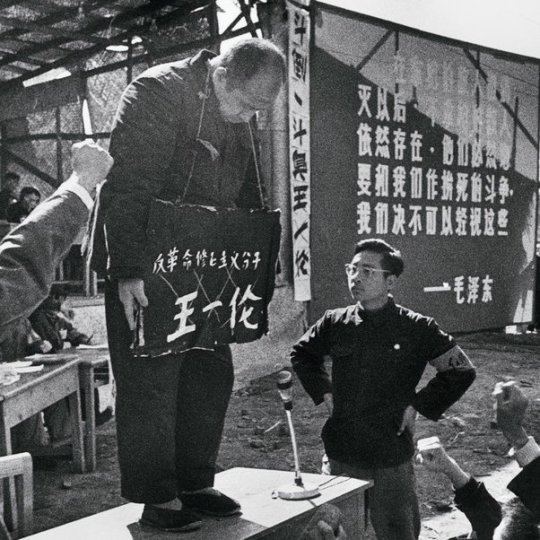
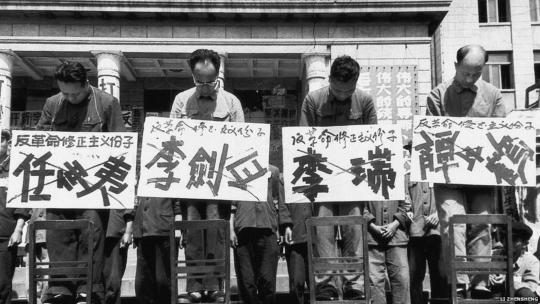

#We The Black Sheep#Kevin Ray#corruption of arts#the arts#social justice activism#critical social justice#ideological conformity#ideological capture#ideological corruption#Westboro Baptist Church#racial discrimination#woke racism#wokeness#woke#cult of woke#wokeism#wokeness as religion#politics is downstream of culture#religion is a mental illness
7 notes
·
View notes
Text
Joining in the repetition of clichés an easy way to remain in the intellectual status quo, and it represents the activity of a truly “closed mind” (using that term in its true sense, not in the sense in which it has become yet another cliché of leftists to hurl in the direction of conservatives). Once ideology takes root in a mind, the weak mind will follow the path of least resistance, seeking false comfort of an ideological cliché.
-Emina Melonic, "Against Political Cliche" (January 11th 2024).
0 notes
Text
getting tired of GCs on twitter endorsing trump i really think being a single issue voter on trans issues is stupid if it means voting for the party that sees women as baby factories
#like ok i kinda get it i do see the appeal in accelerationism but don’t pretend like people’s lives will be better under trump#and if we rely on republicans to sound the alarm on trans ideology we’ll only push away leftists and liberals who could be convinced#at least tras give lip service to the idea of gender non conformity even if in practice they trans kids out of it#like come on abortion is fucking banned in half the states because republicans#really disappointing how many people in the gc movement don’t give a shit ab women they just want to dunk on troons
5 notes
·
View notes
Text
guys look at this absolute banger of a quote from ron desantis
“it’s wrong to have gender ideology"
#on the one hand ofc it's infuriating and dangerous that these people continue to just. say shit and do shit#but also#it's kind of funny because what the fuck are you even talking about?#it's like the gay agenda#we're just saying shit to say shit#like do conservatives not realize that they have a gender ideology too?#like babe *you're* the one constantly fixating on conformity to your silly little binary system and rules#likee#of course of course things are. complex. ok. but like. it's just a really fucking stupid thing to say.#boink#gender
4 notes
·
View notes
Text
People on social media really act like women don't like sexy art, regardless of their sexuality. Lol
"This is why men shouldn't draw women" Honey, the artist is a woman. Modern feminists are the very thing they claim they hate, ironically.
#sexy art#artists#txt#if you are a female you are inherently gonna be into the “soft art”#that sexy art is for men because they are inherently filthy and disgusting#modern feminists are the new age puritans bro#and they claim they HATE them!#i don't understand for the life of me why there are so many women still supporting a movement that actively and constantly stabs them in the#back and hates them if they don't conform to their monolithic ass conception of women#one of the major reasons i'm against them is because i don't want more women falling victims to their shitty ideology#that when you really analyze it it's pretty damn misogynistic as well
2 notes
·
View notes